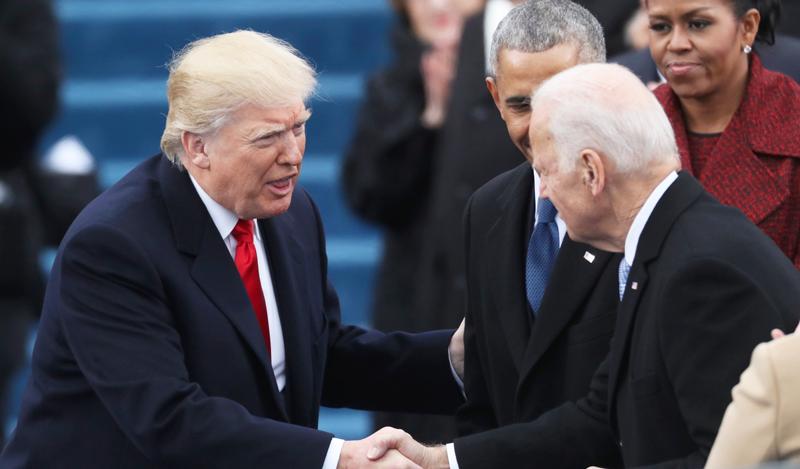What are we to think about our political tantrums or worse? Or maybe, how will today’s divisiveness inform and influence tomorrow?
Today, it seems like every day, the polling prophets tell us what we think. But while they inform us, we are only seeing the surface. Scratches, rough spots, some gouges, but rarely do we get a view of the core. And while defacement distracts us, builders concentrate on the core. Will it hold and protect what we have built?
So let me turn to our Republic. In a journal kept by James McHenry, a Maryland delegate to the Constitutional Convention, he recorded events of the last day of the convention, September 18, 1787. He wrote: “A lady asked Dr. Franklin Well Doctor what have we got a republic or a monarchy – A republic replied the Doctor if you can keep it.”
There have been watershed events in the history of our country and the 2016 election, as it turned out, was one of those. Donald J. Trump’s appeal to voters was often based on harsh criticism of the past. He even questioned the end results of Abraham Lincoln’s actions. He used direct and emotional language. The government was a “swamp” and his opponents were “crooked”. The attacks became especially sharp at his rallies. Hillary Clinton, who he defeated in 2016, was “crooked Hillary” and then at his rallies he led a chant, “lock her up”.
Some mix of Trump’s tactics and Clinton’s weaknesses combined to give Trump a razor-thin election victory. He won the electoral college while losing the popular vote. Yet, in succeeding elections either he or a high percentage of candidates he endorsed lost.
The losing pattern was so clear that Democratic Party funders and operatives began to support the most Trump-like candidate in the Republican primary contest. It was an unseemly but often successful tactic. In essence, candidates on the Left were being given a gift by Trump imitators.
Today the political kingmakers have concluded that it relieves the Democratic Party from having to make the hard decision as to its next nominee. The conclusion: Donald Trump’s negatives will elect Joe Biden regardless of his unpopularity. They are rooting for Trump’s nomination.
In the aftermath of his loss of the Presidency in 2020, the former President’s attacks became feverish. He attacked the integrity of our elections. Since in a democracy elections are a hinge, this attack went to the core of our structure.
And when the Courts—all of them—said there was no evidence that the voting results had been corrupted in Biden’s favor, Trump became even more fevered. And then the attacks on the Capitol occurred. Most recently as investigations of his actions have intensified the attacks have become especially harsh. To sum up. The government: “a swamp.” The Courts: “corrupt.” Elections: “bogus.” In effect Trump claims America is a failed State headed by a corrupt President.
I would suggest that our prophets, the pollsters, expand the scope of opinion sampling. The more searching inquiry: what effect is Trump-style populism having on America’s place in the world beginning with youth in America?
Perhaps America’s teenagers pay no attention to public affairs, but I doubt it. It should be our hope that America’s youth are paying attention—watching their elders and looking for ways to do better. Or, are we raising a generation of distracted cynics?
Our very security is underwritten by faith in America and the rightness of the American dream. America has never been perfect, but the constitutional, legal and economic underpinnings of our immigrant community has mostly been successful and hopeful. While looking back with regret is not infrequent, looking forward with hope is far more common.
I also wonder what the consequences of these attacks are overseas. Our very existence depends in part on how our foreign enemies see us as military and commercial weapons seek their target.
When I was interviewing for a job in the Reagan Administration the then Secretary of Commerce, Malcolm Baldrige asked me this question. Al, he said, “in Washington everybody is after a piece of your ass. How do you rate yourself for aggressiveness?” Yes, Washington is a tough town and New York City, where Trump spent his business career, has a razor-sharp edge. The stakes are high and everybody is looking for an edge.
Yet in both cities there was an informal decorum and for most an ethical baseline. And if tactics edged up to the civil or criminal penalty lines, combatants knew that America’s courts were fair and generally backed off. But, as Trump’s fever peaks he attacks decorum, ethics and the courts. If he doesn’t succeed, he says, then it is because everything we rely on is corrupt. In effect, America is only good if I am winning.
There is, I repeat, an underlying political assumption—a nihilistic one. Rather than appealing to our better instincts, do everything possible to drive up the negatives of your opponents. I can hear the campaign professionals (pragmatists all) saying: “We should do everything possible to make your opponent unacceptable and then you win as the lesser of evils.”
Maybe this is all simply the fumes of politics. A gaseous outpouring that will quickly dissipate and only historians will note. We certainly know that this is not the first time in America’s history that poison has entered the public bloodstream. Always, however, the sooner an antidote is found and used the better off America will be.
Al Sikes is the former Chair of the Federal Communications Commission under George H.W. Bush. Al writes on themes from his book, Culture Leads Leaders Follow published by Koehler Books.



Write a Letter to the Editor on this Article
We encourage readers to offer their point of view on this article by submitting the following form. Editing is sometimes necessary and is done at the discretion of the editorial staff.